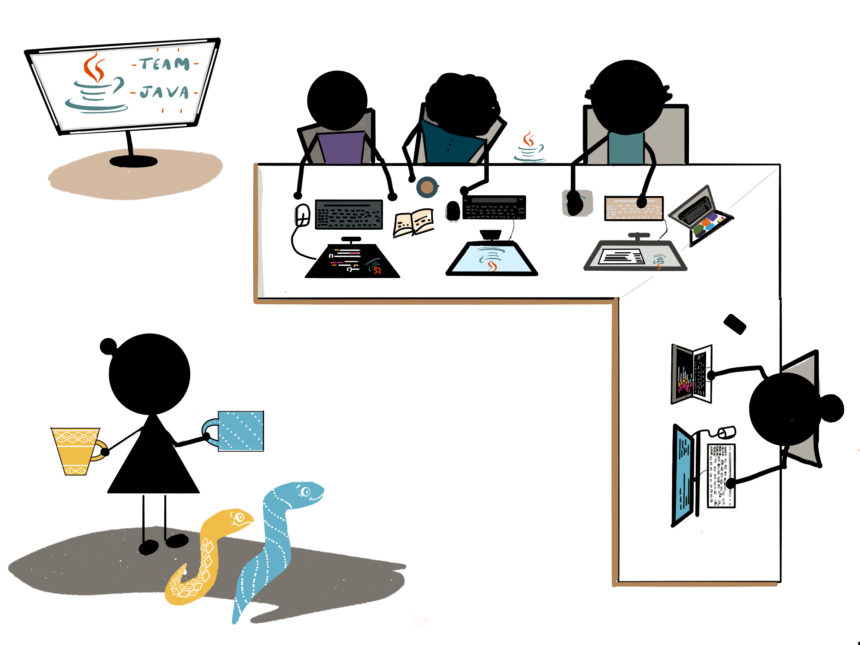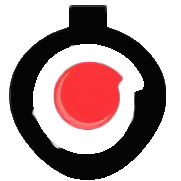Writing a sophisticated computer program often requires a lot of detailed
knowledge. If we do this in Java, we need to know the syntax of the
language, the wide range of libraries available to assist us in the work,
the various tools required to verify and build our programs. If we do this
in Python instead, we are faced with a different syntax, libraries that are named
and work differently, a whole other ecosystem to build and run our work.
Faced with these details, a natural response is to recruit people who
are knowledgeable about a specific ecosystem. Thus we see job descriptions that say “at
least three years of Java”, or even deeper requirements for subsets of that
community, with experience in specific tools. What use is a skilled
Python programmer to such a team?
We’ve always felt that such desires are wrong-headed. The characteristics
that we’ve observed separating effective software developers from the chaff
aren’t things that depend on the specifics of tooling. We rather appreciate
such things as: the knowledge of core concepts and patterns of programming, a
knack for decomposing complex work-items into small, testable pieces, and the
ability to collaborate with both other programmers and those who will
benefit from the software.
Throw such a Python programmer into a Java team, and we’d expect them to
prosper. Sure they would ask a lot of questions about the new language and
libraries, we’d hear a lot of “how do you do this here?” But such questions
are quickly answered, and the impediments of Java-ignorance soon wither
away.
An experienced Pythonista who understands
the core patterns and practices of software development can be a productive
member of a team building software in Java. Knowing how to handle
snakes can be surprisingly handy.
This echoes a long debate about the relative value of specialists and
generalists. Specialists are seen as people with a deep skill in a specific
subject, while generalists have broad but shallow skills. A dissatisfaction
with that dichotomy led to the idea of “T-shaped people”: folks that combine
deep knowledge in one topic, with a broad but shallow knowledge of many
other topics. We’ve seen many such people quickly grow other deep legs,
which doesn’t do much for the “T-shape” name (as we’ll discuss below), but otherwise leads to
success. Often experience of a different environment leads to trying things
that seem innovative in a new home. Folks that only work in a single
technological neighborhood are at the constant risk of locking themselves
into a knowledge silo, unaware of many tools that could help them in their
work.
This ability goes beyond just developer skills. We’ve seen our best
business analysts gain deep skills in a couple of domains, but use their
generalist skills to rapidly understand and contribute in new domains.
Developers and User Experience folks often step outside “their lanes” to
contribute widely in getting work done. We’ve seen this capability be an
essential quality in our best colleagues, to the degree that its importance
is something we’ve taken for granted.
But increasingly we see the software industry push for
increasing, narrower specialization.
So over the last year or so we have started to resist this industry-wide
push for narrow skills, by calling out this quality, which we call an
Expert Generalist. Why did we use the word “expert”?
There are two sides to real expertise. The first is the familiar depth: a detailed command
of one domain’s inner workings. The second, crucial in our fast-moving field
is the ability to learn quickly, spot the
fundamentals that run beneath shifting tools and trends, and apply them wherever we land.
As an example from software teams, developers who roam across languages, architectures, and problem spaces may seem like
“jack-of-all-trades, master-of-none,” yet repeated dives below surface differences help them
develop durable, principle-level mastery. Over time these generalists can dissect unfamiliar
challenges, spot first-principles patterns, and make confident design decisions with the
assurance of a specialist – and faster. Being such a generalist is itself a
sophisticated expertise.
We’ve long noticed that not just anyone succeeds as an Expert Generalist,
but once we understand the traits that are key for such Expert Generalists,
organizations can shape learning programs, hiring filters, and career paths
that deliberately develop them. Indeed our hiring and career progression at
Thoughtworks has been cultivating this skill for over two decades, but doing
so informally. We think the industry needs to change gears, and treat Expert
Generalist as a first-class skill in its own right: something we name,
assess, and train for. (But beware, we find many Expert Generalists,
including at least one author of this article, cringe at the word “expert”.)
The Characteristics of an Expert Generalist
When we’ve observed Expert Generalists, there are certain attributes
that stand out.
Curiosity
Expert Generalists display a lot of curiosity. When confronted with a new
technology or domain, their default reaction is to want to discover more about it, to see
how it can be used effectively. They are quite happy to spend time just exploring the new
topic area, building up some familiarity before using it in action. For most, learning new
topics is a pleasure in itself, whether or not it’s immediately
applicable to their work.
This characteristic is noticeable when Expert Generalists get an answer
to a question. Rather than just typing in some code from Stack Overflow,
an Expert Generalist’s curiosity usually motivates them to ensure they
understand the answer, taking the opportunity to expand their knowledge,
and check that the answer they got is appropriate. It’s also present when
asking a question. There is an art to asking questions that elicit deeper
answers without leading the witness.
Collaborativeness
Learning about a new topic area may require reading, watching videos, and prototyping. But
we see the greatest aid here is another vital characteristic: collaborativeness.
A wise Expert Generalist knows that they can never really learn about most of the things
they run into. Their T-shape will grow several legs, but never enough to span all the
things they need to know, let alone want to know. Working with people who do have those
deeper skills is essential to being effective in new domains.
Working with an otherly-skilled worker allows the generalist to
contribute while the skilled collaborator spots more effective paths that
only a specialist would know. The generalist appreciates these
corrections, learning from them. Learning involves both knowing more about
the new domain, but also learning to differentiate between areas where the
generalist can do primary contributions and areas where the generalist
needs help from the specialist. We notice Expert Generalists are never
afraid to ask for help, they know there is much they are ignorant of, and
are eager to involve those who can navigate through those areas.
An effective combination of collaborative curiosity requires
humility. Often when encountering new domains we see things that don’t
seem to make sense. Effective generalists react to that by first
understanding why this odd behavior is the way it is, because there’s
usually a reason, indeed a good reason considering its context. Sometimes,
that reason is no longer valid, or was missing an important consideration
in the first place. In that situation a newcomer can add considerable
value by questioning the orthodoxy. But at other times the reason was, and
is still valid – at least to some extent. Humility encourages the Expert
Generalist to not leap into challenging things until they are sure they
understand the full context.
This humility extends to recognizing the different trade-offs we see
across architectures. An architecture designed to support large volumes
of simple transactions will differ from one designed to handle a few
complex interactions. Expert Generalists are comfortable in a world where different
trade-offs make sense in different circumstances, usually because their
travels have exposed them to these differences.
Customer Focus
This curiosity and eagerness to collaborate with people with different skills does raise a
danger. Someone driven by curiosity can chase every shiny object. This is where the
characteristic of customer-focus comes into play. We are often impressed with
how an Expert Generalist takes each unfamiliar technology and questions how it helps the
customer. We are fans of Kathy Sierra’s notion that our purpose as software developers is to help our
customers become “badass” at what they do.
Customer-focus is the necessary lens to focus curiosity. Expert
generalists prioritize their attention that the things that will help them
help their users to excel. This encourages learning about what their
customers do, and how they can improve their work. It focuses attention on
technologies that contribute to building those things. Customer-focus
energizes collaboration, encouraging the exchange of information between
customer and technologist, and allowing the Expert Generalist to
coordinate other technologists towards enabling the customers’
excellence.










